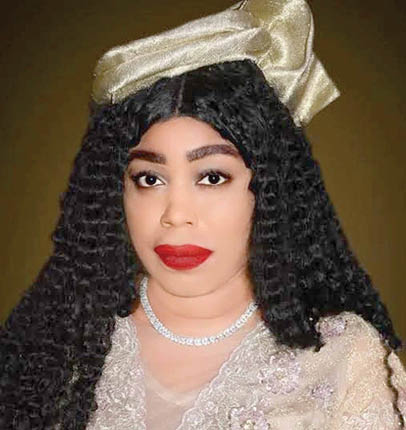How Nigeria’s only female presidential candidate fared after ‘betrayal’ by APM
The hope for a female president in Nigeria was once again dashed after the lone female presidential candidate, Princess Chichi Ojei of the Allied Peoples Movement (APM) was nowhere near the top four contenders in terms of votes for the exalted office. According to the collated results of the 2023 presidential elections announced by the […]

Princess Chichi Ojei
The hope for a female president in Nigeria was once again dashed after the lone female presidential candidate, Princess Chichi Ojei of the Allied Peoples Movement (APM) was nowhere near the top four contenders in terms of votes for the exalted office.
According to the collated results of the 2023 presidential elections announced by the Independent National Electoral Commission INEC, the 40-year-old Delta-born Princess Ojei pulled about 25,000 votes only, notwithstanding her party’s decision to support another candidate at the last minute.
Senior special assistant to Princess Ojei, Barrister Maurice Ebam, told Daily Trust on Sunday that the APM candidate performed exceptionally well, despite the last-minute decision of the party to support another candidate.
He added that “Even when the party decided to do what it did, she still pulled this number of votes, then imagine if Nigerian women had come together, and the party had come together what she will be able to pull,” he said.
Daily Trust reported that the APM was among four political parties that declared support for the PDP presidential candidate, Atiku Abubakar, days to the February 25 presidential election.
The APM presidential candidate in a press release prior to the presidential elections, distanced herself from her party’s decision, when she announced she was still in the race for the number one office in the country.
Barrister Ebam also told Daily Trust on Sunday that his principal was not consulted by her party before the party declared support for the PDP presidential candidate Atiku Abubakar.
“Her excellency was never consulted before the party endorsed Atiku Abubakar in Adamawa State. It just shows you the level of betrayal of the party chairman,” he said.
Meanwhile, the national chairman of the APM Yusuf Dantalle who spoke to Daily Trust on Sunday said the decision to support the Atiku-Okowa ticket was a party discussion. “Looking at how far she has gone, looking at the nature of the election and the performance of our candidate, we knew that objectively, it cannot take us anywhere,” he said.
He added that Princess Ojei was consulted before the decision was taken “In fact, she brought the discussion first to me as the national chairman, so the party held the NWC then the decision was reached by the NEC.
“We all know that of the 18 candidates, only one will emerge, so for us to reduce the tension in the polity and then looking at how far we have gone, we said okay, the best thing is to align and she was consulted before the decision was taken,” he said.
Speaking on the candidacy of Princess Ojie of the APM, a one-time female presidential candidate Sarah Jibril congratulated her for the vision and courage to pull all the way to that point, adding that it is a message to women that “consistency on the vision convinces people.”
Mrs Jibril added that “many of the voters are young people, both young women and young men who have now seen the good of the courage to run for an office, it is really a realistic motivation to the young ones,” she said.
Since the return to democracy in 1999, only four women have so far contested the presidential seat out of a total of 139 male candidates.
Sarah Jibril who contested in 2003 general elections under the Progressive Action Congress (PAC), Major Mojisola Adekunle-Obasanjo founder of the then Masses Movement of Nigeria (MMN) party who contested under the MMN in 2003, Professor Comfort Oluremi Sonaiya who contested under the platform of the KOWA party in the 2015 general election, and Princess Ojei of the APM in the just concluded 2023 presidential elections.
The number of votes scored by female candidates over the years has been meagre with the highest votes any female presidential candidate ever gotten in an election being 157,560.
Associate Professor Abubakar Kari of the political science department, University of Abuja, who spoke about some factors responsible for the low number of votes for women candidates, said that the choice of political party played a major role.
He added that all the female presidential candidates contested under the banner of smaller political parties “the smaller political parties are characterized by a lack of national spread, inability to mobilize enough resources to go all round the country and since Nigerian politics is heavily monetized, it works against them.”
